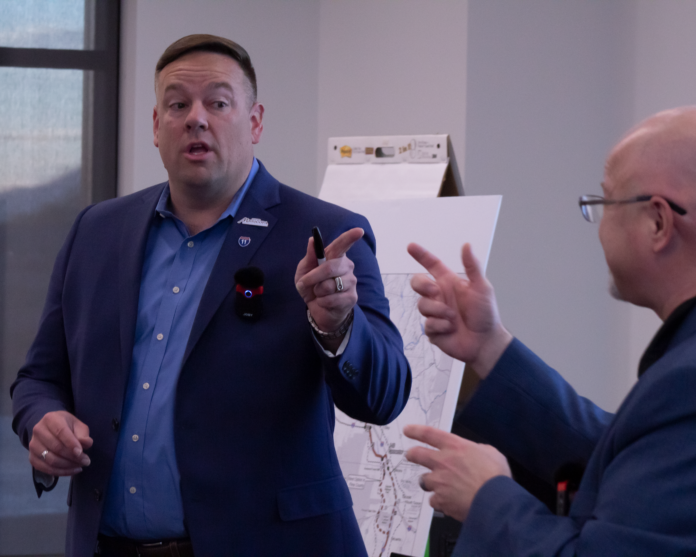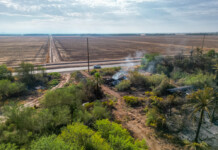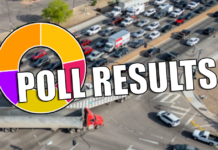
The City of Maricopa held a public Q&A session with Mayor Christian Price and Vice Mayor Vincent Manfredi Thursday evening in a packed meeting room at the city’s Library and Cultural Center.
The purpose of the meeting was to discuss the ramifications of the state Supreme Court invalidating Propositions 416 and 417, which were raising funds to improve roads in Pinal County. The court ruled in a lawsuit filed by the Goldwater Institute stated that the two-tiered sales tax to fund roads, which only taxed amounts less than $10,000, was illegal.
A variety of scenarios were discussed, options explained, and input received during the 90-minute meeting. There were two primary takeaways:
– The nearly $85 million the tax will have raised by the time it is voided is likely gone, and it is not coming back;
– There are no great road funding options going forward, at least in the short term.
Because of the way the Supreme Court ruled, the funds raised to date must be returned to the parties that paid the tax. Since it was a privilege tax levied on businesses, even though the businesses then passed that cost on to consumers, the refund will go to retailers, not back to the consumers.
The tax was to fund two major priorities in the Maricopa area as identified by the Pinal Regional Transit Authority: widening and improving State Route 347; constructing the Sonoran Desert Parkway (formerly known as the East-West Parkway).
The SR 347 segment of that alone would cost more than $350 million if built today. Both Price and Manfredi stressed that the SR 347 improvement is first and foremost on the city’s wish list.
“The 347 is the first priority,” Price said. “It is always the first priority. It’s the most important road for this city.”
After laying out the situation, the mayor and vice mayor engaged the crowd of about 60 in dialog about how best to proceed. It was determined that there are two primary ways to move forward:
– Put essentially the same measure, but with a single-tiered tax in which the complete amount of any sale would be taxed at the previous rate of 0.5%, back on the ballot this November as a 15-year tax. That initial tax was projected to raise about $600 million over its life.
– Wait until 2023 or 2024 and go back to voters with a longer tax, perhaps of 30 years and potentially at a higher rate. Even at the same one-half percent rate, with growth in the area, this tax could raise over double the amount the initial tax would have.
Manfredi said whatever the county does, it is imperative to make the right decision.
“If we go back to the voters with this, we have to be sure we do it right,” Manfredi said. “We’ve already had one bite at the apple. We have to make sure the second bite is the last one, and that it funds everything we need it to fund. Right now, with high gas prices and high inflation, people are not going to be in favor of new taxes, so it could fail, and then where would we be?”
Price said despite the problems associated with asking voters to tax themselves in tough economic times, there are great examples of the benefits just up the road.
“The last five (transportation taxes) that Maricopa County has passed are what built Phoenix as we know it today. The 51, the 101, the 202, the 303, all of those have come from sales taxes that voters passed. So, everyone in Maricopa County can see exactly what their money is buying.”
Editor’s Note: Vincent Manfredi is part owner of InMaricopa.

![Maricopa restauranteur makes Food Network connection [Namkeen Dhaba]](https://www.inmaricopa.com/wp-content/uploads/2024/04/439456716_377105198650519_7536248579664805896_n-218x150.jpg)









![Maricopa’s ‘TikTok Rizz Party,’ explained One of several flyers for a "TikTok rizz party" is taped to a door in the Maricopa Business Center along Honeycutt Road on April 23, 2024. [Monica D. Spencer]](https://www.inmaricopa.com/wp-content/uploads/2024/04/spencer-042324-tiktok-rizz-party-flyer-web-218x150.jpg)

![Maricopa restauranteur makes Food Network connection [Namkeen Dhaba]](https://www.inmaricopa.com/wp-content/uploads/2024/04/439456716_377105198650519_7536248579664805896_n-100x70.jpg)



Hey….but in the meantime keep giving away land like it’s a fire sale and allow residential overdevelopment in a town with two lanes in and two lanes out….clown world…
how about a halt to building 20,000 houses and let roads catch up to what we have now. cause if not the next mayor will have to rise taxes to pay for bad decisions today